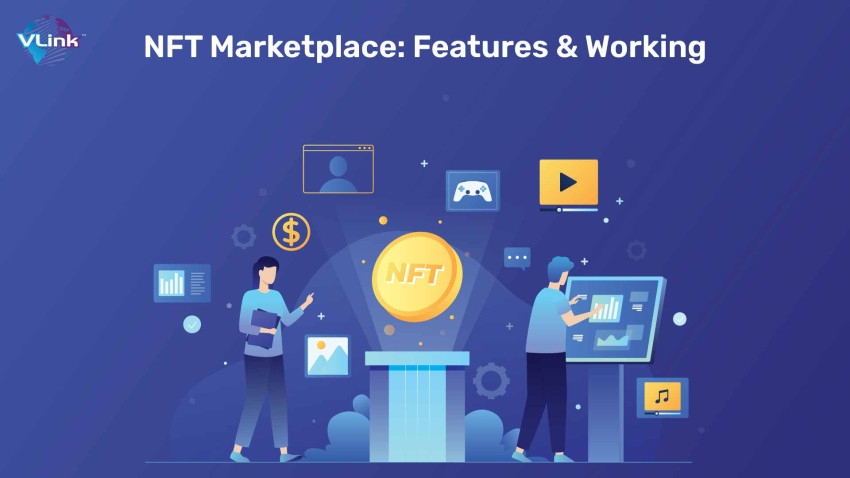
In the age of digital innovation, Non-Fungible Tokens (NFTs) have taken the world by storm. NFTs have gained immense popularity in the past few years, but what exactly is an NFT marketplace, and how does it work? This article will delve into the world of NFTs and provide a comprehensive understanding of NFT marketplaces.
What are NFTs?
NFTs, or Non-Fungible Tokens, are unique digital assets that represent ownership of a specific item, artwork, collectible, or any other digital or physical item. As you’ve heard about Bitcoin and Ethereum, NFTs are a bit different. They are built in a way that these tokens can only be exchanged through a medium without having one-on-on dependency.
In simple words, users cannot individualize the buying or selling them with others. For that, they will need a marketplace, where they can use different features to make the transactions. To know more about NFT marketplaces, continue reading.
What is an NFT Marketplace?
An NFT marketplace is a full-fledged platform for users who look to exchange digital assets in the form of NFTs. It serves as a marketplace for creators, collectors, and enthusiasts to interact and exchange their unique digital assets. These marketplaces are built on blockchain technology, ensuring the security and authenticity of NFT transactions.
There are several NFT marketplace platforms available such as Rarible, NBA top shot, and OpenSea, each with its own unique features and specialties. To create an NFT marketplace like OpenSea, you’ll need assistance from the custom software development experts.
Understanding the Mechanics of an NFT Marketplace?
An NFT marketplace has a simple structure with dynamic features, integrated with blockchain technology. To know how it works and how you can get benefits from it, have a look:
NFTs Creation & Mining
Creators upload their digital content, which can include artwork, music, videos, or virtual real estate, to the NFT marketplace. This content is then "minted" into an NFT. You can try minting to tokenize a digital file in the blockchain.
Buying and Selling NFTs
Buyers browse through the marketplace's listings and select the NFTs they want to purchase. Transactions are completed using cryptocurrency, typically Ethereum, and recorded on the blockchain.
Authenticity with Complete Ownership
Upon purchase, ownership of the NFT is transferred to the buyer, recorded on the blockchain ledger. The blockchain ledger provides a transparent and immutable record of ownership, ensuring the NFT's authenticity and provenance.
NFT Cross-Platform Integration
NFTs can often be used in various applications and games, making them interoperable across different platforms.
Top features of an NFT marketplace
These marketplaces offer a wide range of features to facilitate the buying, selling, and trading of NFTs. Here are some of the top features you can find in an NFT marketplace:
User-Friendly Interface
NFT marketplaces typically provide an intuitive and user-friendly interface, making it easy for both beginners and experienced users to navigate the platform.
Search and Discovery
Users can search for specific NFTs or browse through listings by category, price, popularity, and more. A robust search and discovery feature is crucial for finding the right NFTs.
Wallet Integration
Most NFT marketplaces allow users to connect their cryptocurrency wallets, such as MetaMask or Trust Wallet, for secure and seamless transactions.
Minting Tools
Creators can use minting tools to convert their digital content into NFTs. This feature is essential for artists and content creators who want to tokenize their work.
Auction and Bidding
NFT marketplaces often support auction-style listings, where users can place bids on NFTs. This feature adds an element of excitement and competition to the marketplace.
Instant Buying
Users can choose to buy NFTs at a fixed price without participating in an auction, and hence making the transactional process flexible for the users.
Smart Contracts
NFT marketplaces use smart contracts to facilitate transactions. These contracts automatically execute the transfer of ownership upon purchase, ensuring transparency and security.
Ownership Records
Every NFT purchase is recorded on the blockchain, providing an immutable and transparent ownership history for each token.
Royalty Mechanism
Creators can set royalties on their NFTs, earning a percentage of the resale price whenever their NFT is sold in the future. This feature benefits artists and content creators.
Interoperability
NFTs can often be used in various applications and games, thanks to interoperability. This feature enhances the utility of NFTs.
Community and Social Features
Some NFT marketplaces incorporate social elements, allowing users to follow their favorite creators, join discussions, and build a sense of community.
Profile and Portfolio Management
Users can create and manage their profiles, showcasing their NFT collections and achievements.
Filtering and Sorting
The ability to filter and sort NFT listings based on attributes like rarity, artist, and price range is crucial for buyers looking for specific items.
Security Measures
Robust security measures, including two-factor authentication and secure wallet integration, protect users from potential threats.
Legal and Compliance
NFT marketplaces often adhere to legal and compliance standards, ensuring that transactions meet regulatory requirements.
Analytics and Insights
Some marketplaces offer analytical tools, allowing users to track the performance of their NFTs and make informed decisions.
Community Governance
In some cases, users may have a say in the platform's governance, including decisions related to fees and policies.
Notifications
Users receive real-time notifications about bids, sales, and other relevant activities, keeping them updated on their NFT investments.
These features collectively create a dynamic and engaging environment for creators, collectors, and investors within NFT marketplaces, making them essential hubs for the digital art and collectibles world.
Key takeaways
The future of NFT marketplaces is promising, with potential applications in various industries, including gaming, entertainment, and real estate. In conclusion, NFT marketplaces are revolutionizing the way we buy, sell, and trade digital assets. They offer a unique and secure way to own and exchange digital items while opening up new possibilities for creators and collectors alike.





